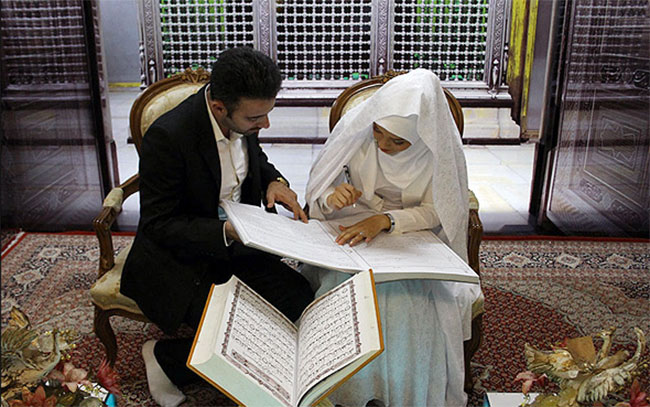- Sexual Problems

It is unrealistic to expect the issue of sex and sex-related problems to mysteriously disappear once a couple gets married.
In the sex-saturated present culture, couples tend to place very high expectations of each other in this area. They also expect instant results.
In reality, it takes time, commitment, disappointment and investment to establish a sexual relationship in marriage which is in tune with the needs of each partner.
It’s important for Muslim couples to walk into marriage with proper information about sex and sexual etiquette from an Islamic perspective (the book Marriage and Morals in Islam, by Hujjatul Islam as-Sayyid Muhammad Rizvi is one such valuable resource). They both need to know what is halal (permissible) and what is haram (forbidden). They should also keep in mind that spouses must never discuss their sexual relationship with others, unless it is to get help for a specific problem and that too one must get it from the right person.
On a similar note, it is important for both the husband and the wife to remember that they need to make themselves physically attractive for each other. Too many couples take marriage to mean an excuse to now let themselves go. The couple or one of the partners may gain too much weight, or may not care about hygiene or their looks in general.
The universal teachings of Islam also instructs the husband and wife to maintain cleanliness and beauty for the spouse. The Prophet of Islam (S) has commanded us that:
إِنّ اللهَ جَمِيلٌ يُحِبُّ الْجَمالِ وَيُحِبُّ أَنْ يُرى أَثَرَ النِّعْمَةِ عَلى عَبْدِهِ.
“Certainly Allah (SwT) is Beauty and He (only) loves beauty and He loves to see the effects of (His) blessings and bounties on His servants.” (Al-Kafi, Volume 6, Page 438)
The Prophet (S) has also told us that:
إِغْسِلُوا ثِيابَكُمْ وَخُذُوا مِنْ شُعُورِكُمْ وَاسْتاكُوْا وَتَزَيَّنٍوا وَتَنَظَّفُوا فَإِنّ بَنِي إِسْرائِيلَ لَمْ يَكُونُوا يَفْعَلُونَ ذلِكَ فَزَنَتْ نِسائُهُمْ.
“Wash your clothes and trim the excess hair on your bodies and brush your teeth and beautify yourselves and keep yourselves clean, since certainly the Children of Israil never did these things and thus, their women committed adultery.” (Nahj al-Fusahah, Page 72)
We quote one final hadith on the importance of keeping clean and looking nice for one’s spouse where the Prophet (S) has been described as:
كَانَ رَسُولُ اللهِ يُنْفِقُ فِي الطِّيبِ أَكْثَرَ مِمّا يُنْفِقُ فِي الطّعامِ
“The Messenger of Allah (S) used to spend more money on perfumes, than he used to spend on food.” (Wasail ash-Shia, Volume 1, Page 443)
Thus, both the husband and wife must take the time out of their schedules to maintain proper hygiene, to look nice for one another and other such things related to their physical appearance. Our beloved Prophet (S) has recommended husband and wife both to do these things.
- In-Laws
The first few years of marriage are not just a period of adjustment for the married couple, rather, it is one of getting used to in-laws as well.
Husbands, wives and in-laws need to practice the Islamic rules of social relations with each other. These include avoiding: sarcasm, backbiting, calling each other by offensive nicknames, and instead, making a special effort to respect each other as a family.
More importantly too, comparisons need to be avoided, since every individual and every couple is different. Therefore, wives should not be compared to mothers and sisters and similarly, husbands should not be compared to fathers and brothers. In-laws should not be compared to parents, and so on.
In addition, there should be regular, healthy contact between spouses and in-laws. This can mean visiting each other at least once or twice a month, or phoning regularly if distance makes it difficult to get together.
We should remember that many times in the Quran, we have been ordered to maintain our family ties and relationships and one of the greatest sins in Islam is to sever ties with family members. However at the same time, the husband and wife must maintain a balance between the time they spend with parents/in-laws and with themselves:
إِنَّ اللَّهَ يَأْمُرُ بِالْعَدْلِ وَالْإِحْسَانِ وَإِيتَاءِ ذِي الْقُرْبَىٰ وَيَنْهَىٰ عَنِ الْفَحْشَاءِ وَالْمُنْكَرِ وَالْبَغْيِ ۚ يَعِظُكُمْ لَعَلَّكُمْ تَذَكَّرُونَ
“Surely Allah (SwT) commands (people) to maintain justice, kindness, and proper relations with their relatives. He forbids them to commit indecency, sin, and rebellion and (Allah) gives you advice so that perhaps you will take heed.”
(Surah 16, Verse 90)
In another verse of the Quran, Allah (SwT) instructs us as such:
يَا أَيُّهَا النَّاسُ اتَّقُوا رَبَّكُمُ الَّذِي خَلَقَكُمْ مِنْ نَفْسٍ وَاحِدَةٍ وَخَلَقَ مِنْهَا زَوْجَهَا وَبَثَّ مِنْهُمَا رِجَالًا كَثِيرًا وَنِسَاءً ۚ وَاتَّقُوا اللَّهَ الَّذِي تَسَاءَلُونَ بِهِ وَالْأَرْحَامَ ۚ إِنَّ اللَّهَ كَانَ عَلَيْكُمْ رَقِيبًا
“O’ Mankind! Have fear of your Lord who has created you from a single soul. From it He created your spouse and through them He populated the land with many men and women. Have fear of the One by whose Name you swear to settle your differences and have respect for the wombs that bore you. Allah (SwT) certainly keeps watch over you.”(Surah 4, Verse 1)
- Realism
Boy meets girl. They fall in love. They live happily ever after. This is the plot of many Hollywood movies, where everyone is “perfect”. Real life is very different.
Couples may enter marriage with high-flying romantic ideas and expecting their partner to be the ideal human, however all humans have good and bad points. Husbands and wives have to learn to accept each other, warts and all and since we ourselves are not perfect, how can we expect that form someone else?
- Making a Schedule and Establishing Rituals
Making a schedule may seem like an end to spontaneity but that is not true. It allows you to establish your own lifestyle and rituals as a couple. It is especially important if both the husband and wife are going to school and/or working. In this scenario, a schedule helps in setting time aside for each other, during a fast-paced week of work and studies.
Some rituals couples can establish may include:
- Praying at least one prayer together.
- Performing the recommended supplications such as Dua-e-Kumayl, Dua-e-Tawassul, Dua-e-Nudbah, etc… together.
- Attending a study circle together once a week.
- Deciding on a weekly menu.
- Having a pancake breakfast every Saturday morning.
- Setting aside one day on which no work or studying will be done.
- Setting a day when both the husband and wife will clean up the house.
- Setting a time to discuss finances and a budget.
- Making a phone call to your spouse during the day.
- Deciding on a particular day and time once a month at least to visit each other’s parents.
By discussing and setting up these rituals, couples learn how to talk to and feel responsible for each other. They also learn to become a team instead of two people living in the same house with separate lives.
Source: The Religion of Al-Islam and Marriage compiled by Arifa Hudda
 In Islam, contrary to Christianity, marriage and sex are not antipathetic to the love for and worship of God. Instead of an obstacle, marriage is regarded as an asset in acquiring spiritual perfection.
In Islam, contrary to Christianity, marriage and sex are not antipathetic to the love for and worship of God. Instead of an obstacle, marriage is regarded as an asset in acquiring spiritual perfection.




